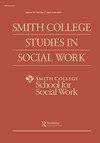在高等教育心理健康专业人员中创造非殖民化和本土化的空间
IF 0.9
Q2 SOCIAL WORK
引用次数: 0
摘要
本文章由计算机程序翻译,如有差异,请以英文原文为准。
Creating Spaces for Decolonization and Indigenization Among Mental Health Professionals in Higher Education
ABSTRACT As Indigenous mental health professionals, we need to articulate and differentiate between uncolonizing spaces, and moving toward decolonization and indigenization in the training of mental health professionals. While these terms are frequently used, the processes involved remain to be clearly articulated. Too often practices that are intended to be decolonizing center the settler-colonizer narrative. Representation of Indigenous peoples as active agents in their own healing matters and their knowledge systems must be included in mental health training. Three necessary elements are required to create these spaces: a) centering Indigenous epistemologies in theory, practice, and research; b) co-constructing learning spaces where Indigenous peoples’ lived experiences are heard, validated, and honored and conducted with cultural humility; and c) practicing ceremonies/rituals to create healing and connectedness within these sacred spaces. Finally, we provide a case study of the creation of a Hui (group in Hawaiian) among Indigenous practitioners, scholars, and students demonstrating transformation of pedagogy and praxis for mental health professionals in training (Barnhardt, 1992; Fellner, 2018a; hook, 2013).
求助全文
通过发布文献求助,成功后即可免费获取论文全文。
去求助
来源期刊

SMITH COLLEGE STUDIES IN SOCIAL WORK
SOCIAL WORK-
CiteScore
1.50
自引率
10.00%
发文量
10
期刊介绍:
Smith College Studies in Social Work focuses on the vital issues facing practitioners today, featuring only those articles that advance theoretical understanding of psychological and social functioning, present clinically relevant research findings, and promote excellence in clinical practice. This refereed journal addresses issues of mental health, therapeutic process, trauma and recovery, psychopathology, racial and cultural diversity, culturally responsive clinical practice, intersubjectivity, the influence of postmodern theory on clinical practice, community based practice, and clinical services for specific populations of psychologically and socially vulnerable clients.
 求助内容:
求助内容: 应助结果提醒方式:
应助结果提醒方式:


